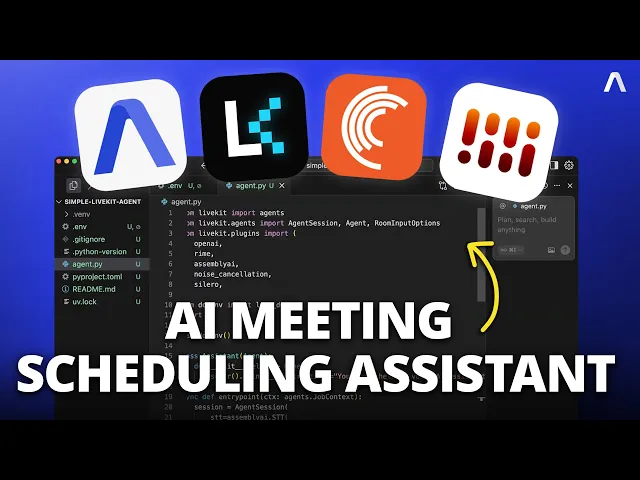Build an AI Assistant for Meeting Scheduling Step by Step!

AI meeting schedulers save your calendar headache
In the increasingly complex world of business scheduling, AI assistants are emerging as the solution to the endless back-and-forth of meeting coordination. The recent tutorial video "Build an AI Assistant for Meeting Scheduling Step by Step" offers a comprehensive look at creating a custom AI scheduling solution that can intelligently manage your calendar and communicate with meeting participants. As businesses struggle with calendar optimization and meeting fatigue, these AI tools represent not just a convenience but a strategic advantage in time management.
Key Points
-
AI scheduling assistants can parse natural language requests, check calendar availability, and autonomously negotiate meeting times with multiple participants—functions that traditionally required human intervention.
-
The integration of large language models (LLMs) with calendar APIs creates a system that understands context and preferences while having direct access to update your schedule, making it more powerful than either component alone.
-
These custom solutions offer significant advantages over commercial scheduling tools by adapting to personal communication styles and organizational workflows, rather than forcing users to adapt to rigid systems.
-
Building a scheduling assistant requires connecting several technological components: an LLM for understanding and generating natural language, API connections to calendar services, and a system for maintaining context across multiple interactions.
Why This Matters More Than You Think
The most compelling insight from this development isn't just the technical implementation but the paradigm shift it represents. We're moving from tools that assist us with specific tasks to assistants that understand our intentions and execute complex workflows autonomously.
This shift matters because knowledge workers now spend an average of 4.5 hours per week just scheduling meetings. For executives, that number climbs even higher. When McKinsey analyzed productivity metrics across 12,000 professionals, they discovered that simplifying administrative tasks like scheduling could reclaim nearly 20% of a knowledge worker's productive time. AI scheduling assistants directly address this inefficiency by eliminating the cognitive load of calendar management.
The Hidden Revolution in Business Communication
What the video doesn't fully explore is how AI schedulers are reshaping business communication norms. Traditional scheduling often follows predictable but inefficient patterns—suggesting times, waiting for responses, resolving conflicts, and sending reminders. This process creates significant communication overhead.
Companies implementing AI schedulers report that meeting-related communications drop by 70-80%. At Accenture, where an AI
Recent Videos
How To Earn MONEY With Images (No Bullsh*t)
Smart earnings from your image collection In today's digital economy, passive income streams have become increasingly accessible to creators with various skill sets. A recent YouTube video cuts through the hype to explore legitimate ways photographers, designers, and even casual smartphone users can monetize their image collections. The strategies outlined don't rely on unrealistic promises or complicated schemes—instead, they focus on established marketplaces with proven revenue potential for image creators. Key Points Stock photography platforms like Shutterstock, Adobe Stock, and Getty Images remain viable income sources when you understand their specific requirements and optimize your submissions accordingly. Specialized marketplaces focusing...
Oct 3, 2025New SHAPE SHIFTING AI Robot Is Freaking People Out
Liquid robots will change everything In the quiet labs of Carnegie Mellon University, scientists have created something that feels plucked from science fiction—a magnetic slime robot that can transform between liquid and solid states, slipping through tight spaces before reassembling on the other side. This technology, showcased in a recent YouTube video, represents a significant leap beyond traditional robotics into a realm where machines mimic not just animal movements, but their fundamental physical properties. While the internet might be buzzing with dystopian concerns about "shape-shifting terminators," the reality offers far more promising applications that could revolutionize medicine, rescue operations, and...
Oct 3, 2025How To Do Homeless AI Tiktok Trend (Tiktok Homeless AI Tutorial)
AI homeless trend raises ethical concerns In an era where social media trends evolve faster than we can comprehend them, TikTok's "homeless AI" trend has sparked both creative engagement and serious ethical questions. The trend, which involves using AI to transform ordinary photos into images depicting homelessness, has rapidly gained traction across the platform, with creators eagerly jumping on board to showcase their digital transformations. While the technical process is relatively straightforward, the implications of digitally "becoming homeless" for entertainment deserve careful consideration. The video tutorial provides a step-by-step guide on creating these AI-generated images, explaining how users can transform...
